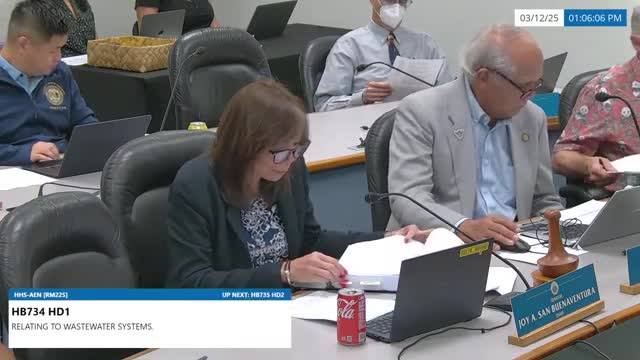Senators weigh cost, equity of wastewater and cesspool bills; health department seeks positions to run grants
Get AI-powered insights, summaries, and transcripts
Subscribe
Summary
Three related measures—HB734, HB735 and HB879—drew broad support from environmental groups, counties and the Department of Health; lawmakers pressed the department on cost, prioritization and local implementation for converting cesspools and updating rules.
A package of bills on wastewater systems and cesspool conversions prompted extended testimony at the joint Senate hearing, where environmental organizations, county officials and homeowner advocates urged lawmakers to ease financial barriers for homeowners while preserving water quality protections.
The bills discussed included HB734 (rules and updates for wastewater systems), HB735 (limits on bedrooms per individual wastewater system) and HB879 (a grant program to help low‑ and moderate‑income homeowners upgrade cesspools). The Department of Health testified in support of the bills but told senators it needed additional staff to administer grant programs.
Why it matters: Hawaii has an estimated large number of cesspools statewide. Witnesses said converting them is expensive and that state rules and county implementation affect cost and prioritization. Supporters argued updated rules, clearer prioritization and higher grant caps are necessary to ensure conversions do not unduly burden homeowners, especially low‑ and moderate‑income households.
Key testimony and concerns - Cost and prioritization: Ted Bolen of the Hawaii Reef and Ocean Coalition and Kim Polinski of The Nature Conservancy supported measures to update rules and raise grant amounts, with Polinski describing groundwater and coastal impacts from failing systems. Bolen said grant limits sometimes do not match local costs and urged raising the cap in HB879 from $20,000 to $30,000 in some cases. - Department of Health role and capacity: DOH representatives said the agency focuses on technical standards and wastewater quality, not market pricing; Anjana Nagato of DOH’s Wastewater Branch said cost is a market issue, and the agency uses National Sanitation Foundation criteria to judge system performance. DOH also clarified it needs three full‑time positions to operate the grant program proposed in HB879 and asked that the committee note that need on the committee report. - Local equity and implementation: Senator DeCoite and other lawmakers pressed DOH on whether rules can create exemptions for areas that are distant from aquifers or oceans. DOH referenced a statewide prioritization tool developed with Sea Grant and said the working group assessed priority by district; implementation and sewer availability remain county responsibilities. - Technical changes: HB735 would allow an individual wastewater system to serve up to five bedrooms regardless of accessory dwelling units, a change county officials said is intended to help housing options in agricultural or plantation‑style settings while still addressing hydraulic capacity concerns.
Committee action: For HB734, HB735 and HB879 the chair recommended passing with amendments; the committee reports were to include requests related to DOH staffing (three FTEs for grant administration) and to continue the $20,000 grant maximum unless otherwise specified. Lawmakers recorded reservations on financing but overall voted to adopt the chair’s recommendations.
Ending: Senators asked DOH to provide cost estimates for the requested positions and to work with counties on prioritization. The committee accepted chair recommendations and directed staff to capture the funding requests and technical amendments in the committee reports.
